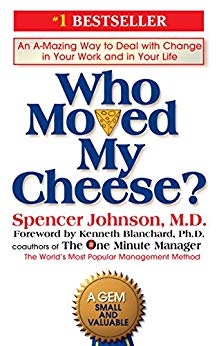

This article is an excerpt from the Shortform summary of "Who Moved My Cheese" by Spencer Johnson. Shortform has the world's best summaries of books you should be reading.
Like this article? Sign up for a free trial here .
What are the best lessons about change? How can we manage change so that we’re ultimately better off for it?
The parable Who Moved My Cheese gives us lessons about change that we can apply to our own lives, starting now. Learn the parable’s lessons about change and how one group of people applied these lessons to their own lives.
Lessons About Change
The First Lesson About Change
Be prepared for change: Pay attention to signs of change in your environment, whether it’s layoffs at your workplace, new aches and pains, or strains in your home life. Consider how potential changes could affect you and develop a plan to handle them – for instance, by learning new skills.
- In the story: Mice Sniff and Scurry noticed the cheese stockpile getting old and dwindling. They were ready (they kept their running shoes handy) to search for a new supply when the old one disappeared.
The Second Lesson About Change
Let go of the past: When things change, move forward quickly. The longer you wait, the more resistance you build to moving, and the harder it’ll be to adapt later.
- In the story: Sniff and Scurry were action-oriented, and set off immediately to search for new cheese. It helped that they also kept things simple and didn’t overanalyze or overcomplicate things by, for instance, getting hung up on “what if’s.”
- In the story: Initially, Haw also stayed with Hem and wished for things to return to normal. But Haw came to his senses and realized the world had changed, and he had to change with it. Later he concluded that adapting to change is easier the less you wait.
- Many people who finally muster the courage to leave a job or relationship that’s not working for them, often wonder in retrospect why they hadn’t made the change sooner.
The Third Lesson About Change
Adapt—Be open-minded to new things: There are always experiences and opportunities available beyond those you are currently familiar with. You might like them even more than what you used to have.
- In the story: Haw found bits of new kinds of cheese (eg brie instead of the cheddar he was used to), and he tried them and liked them. This gave him confidence to keep pushing forward to even better experiences. (He tried sharing the new types of cheese with Hem but Hem rejected them, saying he wanted only the types he was familiar with.)
The Fourth Lesson About Change
Imagine success: Envisioning what success looks like, and imagining yourself succeeding, can improve your attitude. When you think about what you will gain, rather than what you are losing, you realize change can be for the better.
- In the story: Haw at first imagined Sniff and Scurry enjoying new cheese, then he imagined himself, in realistic detail, sitting in his own pile of all kinds of new cheeses. This vision motivated him to keep pushing forward to find new cheese.
- When you imagine success, paint a picture in your mind of vivid detail. Think about how you’d behave in this new successful world. Imagine how you feel and how other people feel.
The Fifth Lesson About Change
Handle your fears: Fear can have one of two effects: 1) It can paralyze you, if you imagine all that can go wrong if you leave your familiar ground, or 2) it can spur you into action if you fear that things will get worse if you don’t do something. The second fear is productive and healthy.
- In the story: Haw feared not finding new cheese if he ventured out into new areas of the maze. But he also realized he definitely wouldn’t find any by staying put. He asked himself, “What would you do if you weren’t afraid?”
The Sixth Lesson About Change
Learn to enjoy change: New experiences, discoveries, and achievements are rewarding, usually more so than continuing to do the same things.
- In the story: Once Haw started searching for new cheese, he realized he felt better just from taking action, and he soon began to enjoy the adventure — he hadn’t realized how complacent he’d gotten from sitting around at the old cheese pile. The key to enjoying change was that he had changed — first his attitude, and then his behavior.
The Seventh Lesson About Change
Be prepared for continuous change: Change is a natural part of life. Change should only be a surprise if you aren’t paying attention, or if you’re operating on erroneous assumptions — for instance, that you’re entitled to having things a certain way.
- In the story: After finding the new cheese at the end of the book, Sniff and Scurry expected and prepared for even more change by continuing to explore new parts of the maze. Haw did the same thing, because he had learned from his mistakes and pledged not to be surprised by change again.
Applying the Lessons About Change
As old friends at a reunion compare their lives and confess to being unsettled by change, one classmate relates the cheese story. The friends talk about which characters they resembled when experiencing change. Some lessons about change or conclusions they share from their lives are:
- If you stubbornly resist change at work, you could end up being fired or let go. The same can happen if you fail to notice change because your mindset is anchored in the past.
- A family retail business that doesn’t change its ways, or change fast enough, to compete with mega-stores could find itself out of business. In a case like this, it might have been better to initiate change than to react to it later. This is an important lesson about change.
- A business that’s been successful in the past (for example, an encyclopedia-selling business) cannot rely on its business model working forever. (Cheese eventually runs out.)
- An important role of managers is to lead employees uncertain about or fearful of change, by painting a picture of success they can get excited about. (Picture the new cheese.)
- From a management standpoint, understanding which characters your employees emulate can help you to help them adapt while benefiting the company as a whole. This is a critical lesson about change.
- Sniffs can help a company innovate by sniffing out opportunity.
- Action-oriented Scurrys can get things done.
- Haws are hesitant but can adapt with encouragement.
- Hems may choose not to adapt even when given the evidence. They might then stop being good fits for your organization.
- Personal relationships can appear “old” like “old cheese,” but this may be the result of old, now unproductive behaviors. New attitudes and behaviors can transform a relationship into something better (new cheese).
- People are more afraid of and more resistant to change when it’s imposed on them from above, because they feel powerless. Peer pressure can also be a factor. Understanding that change is natural and has advantages can help lessen resistance.
- One suggested strategy is to ask your colleagues to read the book. People can then self-identify with the characters, and no one wants to be seen as a Hem!
- Even though you fear change because of what you think you’re losing, you can end up with something better. This is, perhaps, the most important lesson about change.
- Example: A family has to move from the city to the mountains for work. The teenage son is crushed, since he has to give up his swim team. But unexpectedly he learns to ski, and enjoys that even more.)
These lessons about change can help you better manage the transitions in your life.
———End of Preview———

Like what you just read? Read the rest of the world's best summary of "Who Moved My Cheese" at Shortform . Learn the book's critical concepts in 20 minutes or less .
Here's what you'll find in our full Who Moved My Cheese summary :
- The absolute worst thing to do when change is coming
- How to adapt to change, like the key characters
- How to handle change in work and life






